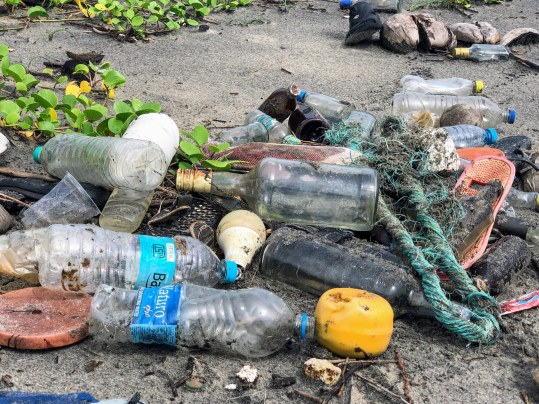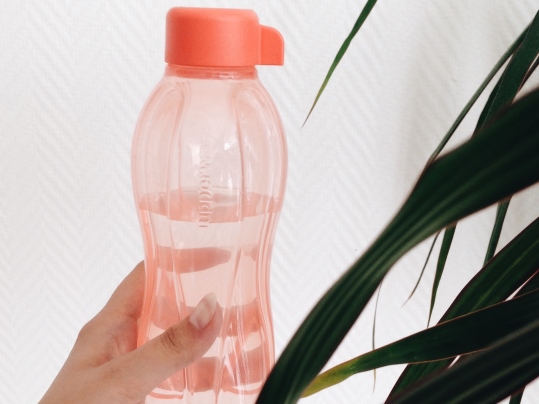Single-Use Plastic: The Final Straw!
Mark Bauer, Environmental Specialist at Forbo Flooring Systems
July 2020

Like it or not, single-use plastic is a material the world quickly needs to move on from. From the large quantities of fossil fuel needed to produce it, to the pollution it causes across our oceans, the material does considerable damage to the earth’s environment. At Forbo, we’d like to see things change and appreciate the efforts being made in Australia as part of its ‘Plastic Free July’ campaign. In fact, the campaign has inspired us so much that we decided to put together our own set of top tips to reduce single-use plastic consumption.
The first step in reducing single-use plastic consumption is to actively purchase more reusable products. This is a change you can enact in your personal life, as well as your professional one. Nowadays, a number of goods that were previously manufactured from single-use plastic, such as straws, shopping bags and cups are made from more recyclable materials, but there still remains some. For example, single-use plastic water bottles remain extremely popular and contribute to significant ecological damage.
According to the Guardian, a million plastic bottles are bought around the world every minute, with the number expected to jump another 20% by 2021 (1). Unfortunately, this incredible rate of consumption far outweighs current recycling efforts, ensuring that more and more single-use plastic bottles will end up in landfill, or worse still, polluting our oceans
Instead, you should look to invest in a reusable water bottle, which helps to reduce your reliance on single-use plastic. Doing so will help make you greener and could help you save money on daily drinks purchases, too!
Within industries, the need to reduce single-use plastic consumption is even greater, particularly in a sector like construction. Despite efforts, the construction industry remains a prolific consumer of single-use plastic products. In fact, a study from Insulation Express (2) found that the construction industry generates around 50,000 tonnes of plastic waste a year in the UK alone . Moving forward, it’s important that specifiers and businesses are on the lookout for new, reusable solutions, which enable more sustainable working practices.


Whilst it’s great to use more recyclable goods, it’s even better to incorporate the concept of the circular economy into your life. First devised in the 1970’s, the circular economy concept looks to move on from the current ‘take-make-waste’ industrial model and towards an economy underpinned by renewable energy sources and reusable products. In doing so, proponents of the concept believe they can create a new economic model, which features no waste, or pollution by design. If achievable, the environmental benefits of adopting this approach would be unprecedented, so it’s worth exploring!
On a personal level, adopting the concept of a circular economy requires buying more products that can be re-used, or recycled.
As a business, the concept can be integrated to a much greater degree, particularly in high-carbon sectors like manufacturing. In short, those in charge of such operations should look to design products that can be 'made to be made again’.
Additionally, businesses should also look to power production facilities using renewable energy sources, such as solar or wind. At Forbo, we take these principles seriously, which is why our four UK manufacturing facilities all use renewable electricity in their operations. In fact, our factory in Bamber Bridge is powered by 100% renewable energy. Similarly, we underpin our product development process with green design principles, which allows us to develop sustainable products in a constructive and consistent manner. As part of our commitment to creating better environments, we ensure sustainability is considered in all business decisions.


By far the easiest tip we have for people looking to help the world reduce its reliance on single-use plastics, is to engage with the topic and show public support where possible. Nowadays, nearly all of us have social media, which entails having a following, regardless of size. Look to share articles, news reports and online content which promote the importance of reducing single-use plastic consumption. If you’re running a business, particularly one of size, then look to highlight campaigns and campaigners who are doing good things to your audience.
At Forbo, we’re big fans of oceans advocate, Emily Penn and her single-use plastic awareness campaign, eXXpedition. Through eXXpedition, Emily has set up a pioneering, all-female sailing voyage, which showcases the devastating environmental and health impacts of single-use plastic and toxics in the world’s oceans. Beginning in 2019, Emily and her team have been on a journey around the world, documenting first-hand the amount of plastic waste that ends up in our seas. Amplifying voices, such as Emily’s doesn’t only help to raise awareness around this serious issue but could inspire others reading it to do the same.
ADD LINK TO CIRCULAR ECONOMY WHITEPAPER ONCE READY